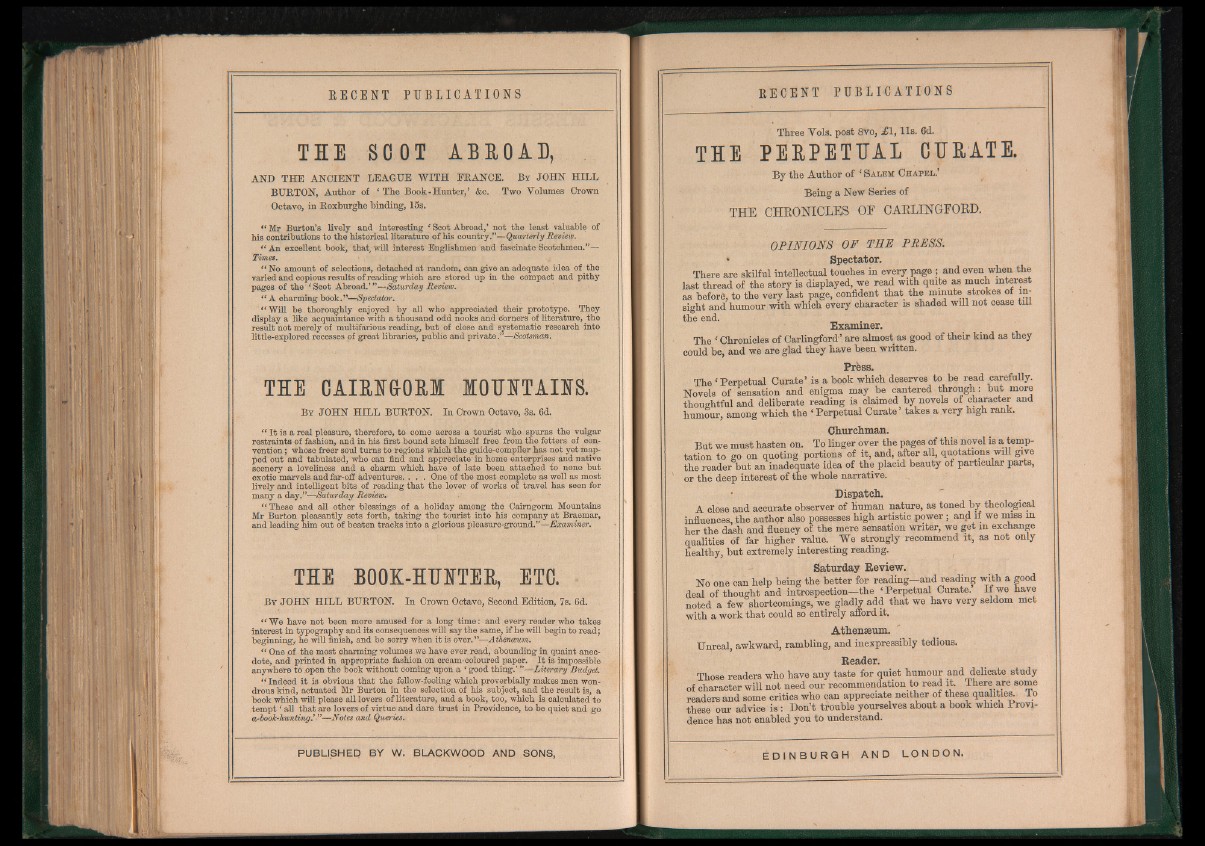
KECENT PUB L I C A T I O NS
TH E SOOT ABROAD,
AND THE ANCIENT LEAGUE WITH FRANCE. By JOHN HILL
BURTON, Author of ‘ The Book-Hunter,’ &c. Two Volumes Crown
Octavo, in Roxburghe binding, 15s.
te Mr Burton’s lively and interesting eSoot Abroad,’ not the least valuable of
his contributions to the historical literature of his country?*—- Quarterly Review.
(C An excellent book, that, will interest Englishmen and fascinate Scotchmen.”—
Times.
“ No amount of selections, detached at random, can give an adequate idea of the
varied and copious results of reading which are stored up in the compact and pithy
pages of the ‘ Scot Abroad.’ ”—Saturday Review.
“ A charming book.”—Spectator.
“ Will be thoroughly enjoyed by all who appreciated their prototype. They
display a like acquaintance with a thousand odd nooks and corners of literature, the
result not merely of multifarious reading, but of close and systematic research into
little-explored recesses pf great libraries, public and private.”—Scotsman.
THE CAIRH&ORM IOUHTAIUS.
By JOHN HILL BURTON. In Crown Octavo, 3s. 6d.
“ I t is a real pleasure, therefore, to come across a tourist who spurns the vulgar
restraints of fashion, and in his first bound sets himself free from the fetters of convention
; whose freer soul turns to regions which the guide-compiler has not yet mapped
out and tabulated, who can find and appreciate in home enterprises and native
scenery a loveliness and a charm which have of late been attached to none but
exotic marvels and far-off adventures. . . . One of the most complete as well as most
lively and intelligent bits of reading that the lover of works of travel has seen for
many a day.”—Saturday Review.
“ These and all other blessings of a holiday among the Cairngorm Mountains
Mr Burton pleasantly sets forth, taking the tourist into his company at Braemar,
and leading him out of beaten tracks into a glorious pleasure-ground.”—Examiner.
THE BOOK-HUHTER, ETC.
By JOHN HILL BURTON. In Crown Octavo, Second Edition, 7s. 6d.
We have not been more amused for a long time: and every reader who takes
interest in typography and its consequences will say the same, if he will begin to read;
beginning,, he will finish, and be sorry when it is over.”—Athenaeum.
“ One of the most charming volumes we have ever read, abounding in quaint anecdote,
and printed in appropriate fashion on cream-coloured paper. I t is impossible
anywhere to .open the book without coming upon a ‘good thing.’ ”—Literary Budget.
“ Indeed it is obvious that the fellow-feeling which proverbially makes men wondrous
kind, actuated Mr Burton in the selection of his subject, and the result is, a
book which will please all lovers of literature, and a book, too, which is calculated to
tempt ‘ aU that are lovers of virtue and dare trust in Providence, to be quiet and go
atrhooJc-huntvng.1 •”—Notes and Queries.
RE C E N T p u b l i c a t i o n s
Three Vols, post 8vo, £ 1 ,11s. 6d.
THE P E R P E TU A L CURATE.
B y th e A u th o r o f ‘ S alem Ch a p e l .’
Being a New Series of
THE CHRONICLES OE CARLINGEORD.
OPINIONS OF THE PRESS.
Spectator.
There are skilful intellectual touches in every page ; and even when th e
last thread of the story is displayed, we read with quite as much interest
as before!, to the very last page, confident th a t the minute strokes ot in sight
and humour with which every character is shaded will not cease till
the end. _ . Examiner.
The ‘ Chronicles of Carlingford'1 are almost as good of th eir kind as they
could be, and we are glad they have been written.
Press.
The ‘ P erpetual Curate’ is a book which deserves to be read carefully.
Novels of sensation and enigma may be cantered through: b u t more
thoughtful and deliberate reading is claimed by novels of character and
humour, among which th e ‘Perpetual C u ra te ’ takes a very high rank.
Churchman.
Bu t we m ust hasten on. To linger over the pages of this novel is a temptation
to go on quoting portions of it, and, after all, quotations will give
the reader b u t an inadequate idea of the placid beauty of particular parts,
or the deep interest of th e whole narrative.
Dispatch.
A close and accurate observer of human nature, as toned by theological
influences, the author also possesses high artistic power ; and if we miss in
h er the dash and fluency of the mere sensation writer, we get m exchange
qualities of far higher value. We strongly recommend it, as n o t only
healthy, b u t extremely interesting reading.
Saturday Review.
No one can help being the b e tte r for reading—and reading with a good
deal of thought and introspection—th e ‘Perpetual Curate. I fwe have
noted a few shortcomings, we gladly add th a t we have very seldom met
with a work th a t could so entirely afford it.
Athenaeum.
Unreal, awkward, rambling, and inexpressibly tedious.
Reader.
Those readers who have any taste for quiet humour and delicate study
of character will not need our recommendation to read it. There are some
readers and some critics who can appreciate neither of these qualities. To
these our advice i s : Don’t trouble yourselves about a book which Providence
has not enabled you to understand.